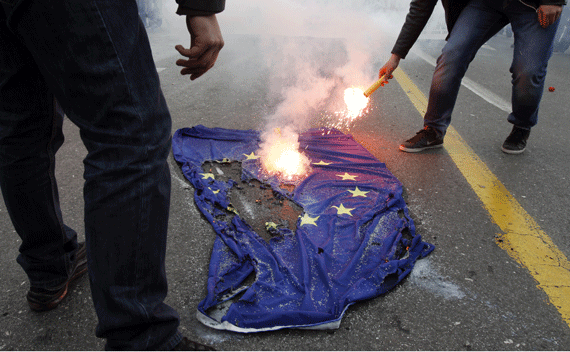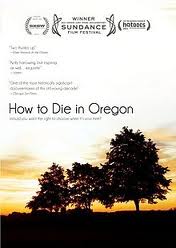
Greek youths burn the European Union flag during a protest, in Athens (Yiorgos Karahalis/ Courtesy Reuters).
After watching the highly praised independent documentary winner of the Grand Jury Prize at the Sundance Film Festival, How to die in Oregon, I could not resist to connect the dots with the EU. This powerful, and in some levels traumatizing, documentary looks at the controversial Death with Dignity Act adopted by the state of Oregon, which legalizes physicians aid-to-dying terminally ill patients. In our developed/civilized societies – read Global North – the questions of death and euthanasia are taboo due to inflexible political and religious heritage. By maintening this medical comparison, if one considers the financial, economic, political, social, and cultural crises, the EU can easily be diagnosed as severely ill; but is the EU terminally ill? What are the options for EU? Death? Integration?
The Eurozone crisis has been detrimental to the stability and vitality of the EU and its Member States. The managed collapse of Greece, as well as the  very worrisome status of Italy, Portugal, and Spain have created a sense of urgency in trying to save the euro. Many have argued that a collapse of the euro would ultimately lead to the death of the European experiment. But taking in consideration the powerful waves of euroskepticism rising throughout Europe, shouldn’t the EU be killed by now? Or has the EU been kept alive, even though very unhealthy? Should it be time to plug-off the experiment and go back to traditional European powers’ politics?
very worrisome status of Italy, Portugal, and Spain have created a sense of urgency in trying to save the euro. Many have argued that a collapse of the euro would ultimately lead to the death of the European experiment. But taking in consideration the powerful waves of euroskepticism rising throughout Europe, shouldn’t the EU be killed by now? Or has the EU been kept alive, even though very unhealthy? Should it be time to plug-off the experiment and go back to traditional European powers’ politics?
In order to look at the health of the EU, the variable of popular supports needs to be taken into consideration. Based on the media and general feeling in Europe, the degree of popular support has been declining for decades now. At least this has been an assumption. According to data from the Eurobarometer, the question “in general, does the EU conjure up for you a very positive, fairly positive, neutral, fairly negative or very negative image?” leads to very surprising results illustrated in the four charts below. Each chart below represents different years – 2003; 2008; 2010; 2012 – and includes key EU Member States facing different situation: crisis, growth, or stagnation.
Source: Eurobarometer
It is only in 2003 and 2012 that the perceptions of the EU were the lowest. Quite interestingly, in 2008 and 2010, so right after the beginning of the financial crisis and the collapse of Ireland and Greece, the perception of the EU remains quite positive in a majority of the Member States.
Concerning the issue of the Euro, the story is as well quite fascinating. Despite the considerable crisis and the ‘euro-bashing’ taking place domestically throughout the different rounds of legislative and executive elections, the polls show that Europeans – at the exception of the British, not a member of the Eurozone – tend to see the Euro from a positive angle as illustrated by the charts below.
Source: GMF. 2012. Transatlantic Trends, p. 20.
At the moment, the EU is going through a rough time. The international financial crisis, the eurocrisis, and the domestic crises are real. The debate occurring on either the creation of a banking union or a financial union is an important one. However, no clear decision may take place before the elections of the next German chancellor next year.
So far the approach/strategy to solving the crisis resides in a series of extremely complex reforms and treaty changes that only a minority of experts truly
understands. In a recent interview, Jacques Delors, one of the founding fathers of the Euro, declared that “for now rules are being multiplied, even though they remain to be clarified and applied. But the moment will come when the rules will meet their limits and could not be replaced by a clear vision of what we [Europeans] want to do together.” Even though Gideon Rachman of the FT called on blaming Europe’s founding fathers in his excellent op-ed, Jacques Delors is absolutely right in underlining the need of a vision. The lack of visionary politicians – as underlined in a previous blog – is hurting the future of the EU. The solution of the current eurocrisis is mainly a political one, not an economical or financial. Political choice must been made before any types of further regulations, austerity measures, and treaty change.
One of the conclusions consists in underlining the considerable gap between perceptions and reality. The general feeling is that the Euro will not survive considering the degree of dissatisfaction, however the numbers tell us a totally different story. President Barroso was right when claiming that the solution to the crisis can be found in “more Europe.” Even the heads of states and governments have finally agreed with the need of “more Europe.” Unfortunately, their approach to “more Europe” goes with seeking for a strategy leading to less Europe and more national power. Narratives are saying yes, while actions are proving the contrary. If the ignition does not come from the Member States, the Commission may be a key actor. During Barroso’ State of the Union on September 12, 2012, the President of the Commission clearly identified that the Union was facing several crises at once: financial and economic; social; political; and of confidence. His State of the Union was constructed in order to lead his argument towards the utilization of the forbidden F-word: federation. He said “let’s not be afraid of the words: we will need to move towards a federation of nation states. This is what we need. This is our political horizon.” Barroso’s role in stating this conclusion was an important step for the future of the EU. So far it is only an idea, but it will have to germinate, which is known as integration. Debate will be needed, as well as a another Treaty change; because, “in Europe,” claimed Barroso, “we need no more walls dividing us? Because the European Union is stronger as a whole in keeping the integrity of its single market, its membership and in its institutions.”
So how bad is it doctor? Well, the EU is in crisis, but it is not dead. The European construction is still advancing and has never really stopped if one counts the different rounds of reforms, treaty changes, and high level meetings. Even though popular support is not as low as described in mainstream media, the crisis of Europe is real. The approach adopted by the heads of states and governments since the early round of the
crisis in 2008 has not been the appropriate one. It has been too narrow and too technical. Technicalities and institutional transformations are necessary but not at the moment. What the EU needs is a clear vision: what should the EU be in the future? What should be the role of tomorrow’s EU? The last years of crisis have demonstrated that the EU of our grandparents is not the appropriate one, and needs to be modified and transformed. But in what? And how? This time it must be the decisions of the peoples of Europe through national and European debates; and through the European Parliament. The European Parliament has received considerable criticism for its inactions and inabilities to act. Brussels will have to wait before booking its flight to Oregon. Instead 2014 should be circled on every European citizen’s calendar as they will be voting for the next generations of European deputies.